Each December, I like to reflect on the best things I’ve read over the course of the year, and I’d like to share some of those with you. You’ll notice that none of these are explicitly tech-related as I don’t find myself reading many tech books cover-to-cover anymore.
You can read last year’s favorite books here.
Lincoln’s Melancholy
by Joshua Wolf Shenk

I’ve read a few different books about the life of Abraham Lincoln, of which you’ll find several appearing on my annual favorite books list. As I’ve explored Lincoln’s mindset, I often found myself curious about the contradictions often described in accounts of him. While he was a joyous conversationalist and storyteller, he was also frequently withdrawn and distant. While he pushed through unspeakable tragedy and strife, he also regularly had a gloomy outlook. These contradictions, combined with the tragedies of his childhood, often led me to wonder if he experienced some form of depression. Lincoln’s Melancholy explores this exact topic.
Shenk hypothesizes that Lincoln suffered from Melancholy, a feeling of pensive sadness often linked with depression. The book builds his case by examining Lincoln’s own words and accounts from primary sources who had dealings with him throughout his life. He outlines the Lincoln family’s history with mental illness that might suggest a biological predisposition toward depression, the early deaths of Lincoln’s parents and first love, and his own words and actions that suggest periods of deep emotional distress.
“I am now the most miserable man living. If what I feel were equally distributed to the whole human family, there would not be one cheerful face on the earth. Whether I shall ever be better I can not tell; I awfully forebode I shall not. To remain as I am is impossible; I must die or be better, it appears to me.”
– Lincoln in a Letter to Jon Stuart, 1842
Shenk approaches the exploration of Lincoln’s mental state from multiple perspectives. I was impressed with the depth of his coverage of psychology literature, connecting what we know about depression now to what little was known of it then. The book is effectively equal parts history and psychology while also deeply exploring facets of Lincoln’s shifting beliefs on religion and policy issues.
The book isn’t entirely sadness, given what the topic might expect you to believe. We all know that Lincoln achieved great success in many ways, and Shenk argues that this was, in part, fueled by his melancholy:
Whatever greatness Lincoln achieved cannot be explained as a triumph over personal suffering. Rather, it must be accounted for as an outgrowth of the same system that produced that suffering. This is not a story of transformation but one of integration. Lincoln didn’t do great work because he solved the problem of his melancholy. The problem of his melancholy was all the more fuel for the fire of his great work.
Shenk, Joshua Wolf. Lincoln’s Melancholy: How Depression Challenged a President and Fueled His Greatness (p. 156). Houghton Mifflin Harcourt. Kindle Edition.
I admit that I had low expectations for this book because of the inherent difficulty in examining theories about the psyche of people long gone. However, I walked away impressed and thoroughly convinced that Lincoln did suffer from chronic melancholy or depression and that those things were integral to his success. I’ve always felt drawn to Lincoln for reasons too long-winded to explain here, so it’s notable for me that Lincoln’s Melancholy also helped me better understand some quirks of my own mental health, which was an unexpected but welcome surprise. I almost didn’t give this book a chance, but it wound up being the best thing I read all year.
Automating Inequality
by Virginia Eubanks
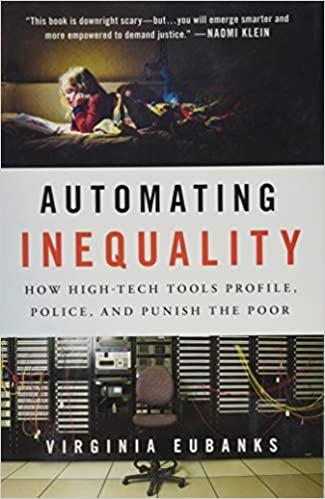
If you work in cyber security long enough, you figure out that many of the problems manifest on computers stem from human decisions — intentional or otherwise. Automating Inequality is about how the inherent biases and misunderstandings of humans show up in algorithms and hurt people the algorithms are intended to help.
Eubanks describes the concept of a digital poorhouse and provides three case studies that demonstrate how systems meant to increase efficiency in their service of the public needs incorporated significant flaws that left many underserved. They are:
- Indiana’s healthcare coverage application review system
- Los Angeles’s system for prioritizing homeless people for housing
- Pittsburgh’s child welfare statistical model predicting whether children are likely to be victims of future abuse or neglect
In each of these cases, poor human decision making or understanding of problems led to these systems having catastrophic outcomes for real people who were denied medical coverage, left homeless, or abused. A salient point that stems from this is that when systems exist to serve large numbers of people, the margin for ignoring errors gets bigger. A system serving 1000 people can ignore a dozen, but a system serving 10 million people can ignore 100K. As we rely more on tech at a larger scale, we tend to automate failure at the same scale we automate success.
Automated eligibility systems and predictive analytics are best understood as political decision-making machines. They do not remove bias, they launder it, performing a high-tech sleight of hand that encourages us to perceive deeply political decisions as natural and inevitable. They reinforce some values: efficiency, cost savings, adherence to the rules. They obscure or displace others: self-determination, dignity, autonomy, mutual obligation, trust, due process, equity. They embody very particular ways of understanding the world, and foreclose more promising visions. The reality is that our current systems are not designed to provide care or secure social justice; they are built to manage the symptoms of austerity.
Eubanks, Virginia. Automating Inequality (pp. 224-225). St. Martin’s Publishing Group. Kindle Edition.
I think this book’s value is in the case studies themselves and showing how real-world problems manifest in algorithms that are prone to error. These issues are hard to identify and fix because they often require understanding the social issues trying to be solved, limiting factors imposed on the solutions (political and financial mostly), and the technology where it all comes together. More and more, I begin to believe that rooting out algorithm bias falls within the realm of information security practitioners. After all, availability is a key tenant of security, and bias in algorithms threatens critical services’ availability to people that need them the most.
The Power
by Naomi Alderman
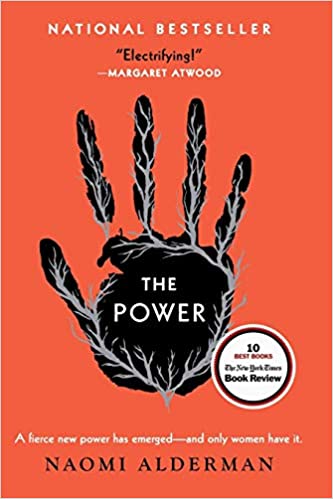
I picked up The Power after my wife read it in her book club and suggested that I might like it. It is a fictional novel describing an imagined history of a period that begins when women all across the world start to develop the ability to generate electricity from their bodies. As these women figure out how to wield this newfound power, the shape of the world and control dynamics begins to shift.
Alderman frames the book through several first-person stories, with many of them converging as the story progresses. I don’t read much fiction, but when I do, I prefer the first-person framing because I am intrigued by how authors portray what people think while interesting events transpire. I thought Alderman did a great job here, effectively contrasting the conflict within several characters from others’ narrow absolutism. The book also had a Margaret Atwood kind of feel to it, which is no surprise as her quote appears on the cover, and Atwood mentored Alderman.
When I first started reading The Power, I thought it would be a story about women coming to terms with their newfound power and how the world shifted. Those themes were certainly there, but a broader and more powerful theme emerged: the effects of tremendous and unbalanced power blind people to reality, and it doesn’t matter what that power is or who wields it. This is one of those books I sat and thought about for a long time after I consumed the final pages.
In a Different Key: The Story of Autism
by John Donvan and Caren Zucker

I once heard autism described as like being trapped inside your own mind. While not completely accurate, I can’t think of many scarier propositions than that. While my psychology research doesn’t tread too far into the clinical side of things, I’ve always had an interest in autism spectrum disorder, so I was excited to dig into this book.
In a Different Key is a historical examination of autism from its early obscurity as a potential form of schizophrenia to its current classification as a spectrum disorder. It focuses on many facets of the condition, including its definition, diagnosis, treatment, and societal perspective. Donvan and Zucker tell the story of autism through the lens of the people who defined it — parents, scientists, and autistic people themselves. This made the book incredibly approachable and engaging, which was crucial since it was fairly long.
While most of what we knew about ASD came into existence in the past 50 years, Leo Kanner initially coined the term in the 1940s. I gained a much better understanding of ASD itself, but I also learned about the egregious early failures in diagnosis, treatment, and perception of autism that doomed many children to institutionalization and condemned their parents as the source of the issue.
Refrigerator mother. That was the term. And it was a slur—the first seed of which was planted in Time magazine’s earliest-ever report on the topic of autism, which ran on April 26, 1948, under the headline “Medicine: Frosted Children.” The main point of the piece was to introduce Time’s readers to the existence of these rare “diaper-aged schizoids,” who were “happiest when left alone.” But the whole thing was written with a heavy slant of blame, summed up in the magazine’s rhetorical question: “Were the cold parents freezing their children” into autism? In all documented cases, according to Time, the mothers and fathers were of one particular type. These were parents who “hardly knew their children,” who were “cold” and “undemonstrative.” To put it bluntly, “there was something wrong with all of them.”
Donvan, John; Zucker, Caren. In a Different Key (p. 79). Crown. Kindle Edition.
Eventually, psychology had an ethical revolution. The combined advocacy of the research community, parents, and various autism lobbying groups helped push the disorder’s diagnosis and treatment to a much better place (with a few bumps along the way).
In a Different Key also gave me a better understanding of how much is still unknown about the disorder and many of the different approaches being used to study it. As you might expect, it also covers and fully debunks the association between autism and vaccinations that saw a media whirlwind in the 2000s.
I found this book to be a great mix of human-centered storytelling, science, and history. It’s a time commitment but is worth that time if you’re interested in these topics.
Sandworm
by Andy Greenberg
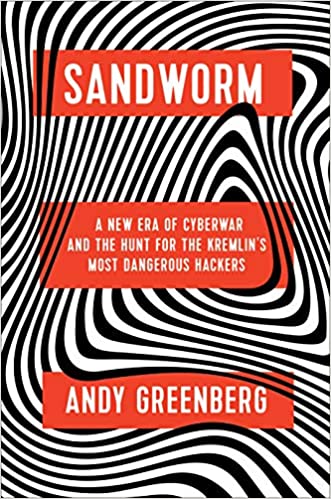
Like many readers of this blog, I spend much time reading about the minutiae of specific targeted cyber attacks. It sometimes becomes difficult to achieve a broader perspective on them. That’s why I like reading books like this one; they provide that perspective.
Sandworm provides a concise history of Russian attempts to leverage computers to carry out strategic goals by hacking into public and private networks worldwide. It covers several events you’ve probably heard about:
- DDoS attacks against Georgia in coordination with physical attacks
- The impact of Stuxnet on digital/physical espionage
- Destructive against Ukrainian media and transportation companies using BlackEnergy, Mimikatz, and other tools.
- The Shadow Brokers breach of the NSA and resulting tools leak
- Attacks against the Democratic National Committee and resulting data leaks
- Attacks against the Ukrainian power grid
- Olympic Destroyer and the attacks against the South Korean Olympics
- The proliferation of WannaCry and NotPetya worms and the global impact
I love this book the most because it’s framed through the lens of security researchers and tells the story through the lens of the people that discovered and investigated these breaches. This was personally gratifying as someone who does this work for a living, but also because I saw familiar names like Rob Lee, Jake Williams, and John Hultquist. By telling the story through analysts while also focusing on the hacks’ tangible impacts, Greenberg humanizes a type of story that so often is devoid of humanity (good and bad).
Overall, Sandworm connected some dots for me and brought a more global view on Russian cyber attacks. He also spotlights some facets of Russian military and political doctrine centered on asymmetric offensive actions. Overall, I left with a better framework that I’ll use for understanding future Russian cyber operations, and undoubtedly, those who will try to mimic their actions. While I won’t say this is required reading for information security analysts, it approaches that territory if you work in threat intelligence.
Hamilton
by Ron Chernow

Like many folks, I watched the Hamilton music on Disney Plus for the first time this year, and I left it wondering why I never learned much about Hamilton in school. So, I set out to fill that gap by reading the book that inspired the musical.
I’ve read several biographies on political leaders, and Chernow is one of the most engaging biographers I’ve ever read. It helps that he has such a potent story to tell here, but he moves through it effortlessly without dwelling too long in any specific or seemingly unimportant era. He does a good job separating Hamilton’s story from his analysis and effectively calls out areas where there isn’t enough support to state strong conclusions. He also weaves sources into the narrative as needed to highlight when and where details came out that refuted or confirmed earlier perceptions. In these sections, I began to understand some notion of why I didn’t learn much about Hamilton in school.
Overall, the book paints a fairly positive image of Hamilton. I am convinced that no person shaped the structure of the American government more than Hamilton. From the initial outlines in the Federalist papers to our financial system’s design to his impacts on foreign relations — everything was written on a clean slate and set a new precedent. Hamilton was undoubtedly brilliant, had an intellectual motor that didn’t stop, and appreciated the lessons that history was available to teach.
“The first great skeptic of American exceptionalism, he refused to believe that the country was exempt from the sober lessons of history.”
Chernow, Ron. Hamilton. Penguin Books.
Of course, it’s not all positive. Chernow describes and revisits the Reynold’s affair and touches on evidence that Hamilton may have been somewhat involved in the purchase and sale of enslaved peoples. He also describes Hamilton’s support of the Alien and Sedition acts, which seems odd since this was Hamilton himself was an immigrant. It’s important that these events were recorded because no person is all good or bad. The biography captures the complexity of human nature and the inherent contradictions present in all of us.
If you enjoyed the play, then the book will fill in many of the gaps for you and highlight some inaccuracies (there weren’t as many as I expected). It’s a long read but very engaging. If you’ve read biographies of other leaders during this time, you’ll enjoy fitting Hamilton’s experience into these early events. I was left particularly curious about the lives and experiences of supporting characters like Eliza Hamilton (who lived 50 years after Hamilton’s death), Aaron Burr (who rose to VP and killed Hamilton in a duel), Hercules Mulligan (a tailor/spy), Marquis de Lafeyette (a french military advisor), and others.
The Guardians
by John Grisham
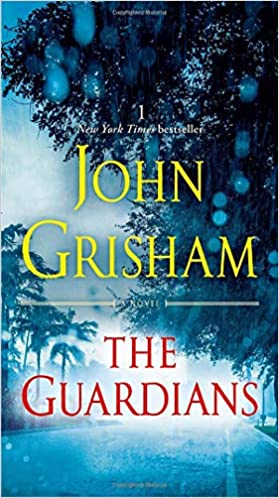
I’ve read a lot of Grisham, and like many, I’ve found most of his recent work lacking from his early titles like A Time to Kill and The Firm. However, The Guardians is probably the best thing he’s written in a while.
The story centers on Cullen Post, a former prosecutor whose life experiences led him to leave the law for a while before returning to work for a non-profit specializing in exonerating those sentenced to death. Grisham frames the story through a single case centered on a lawyer killed at his desk while working late one night and a young black man who was convicted and sentenced to death for the murder. While this case is the book’s primary plot, you also follow Post on his long drives throughout the South as he journeys through prisons, courthouses, and local law enforcement offices in pursuit of anything that will help his small billet of clients. Along the way, you develop a sympathetic relationship with many of the convicted characters, guilty or not, as you slowly learn each of their fates.
I found Cullen Post and the support case to be incredibly compelling characters. The story weaves a narrative of the south, our legal system, and humanity together in a way that Grisham made famous. If you’re the introspective sort, you’ll probably find yourself thinking deeply about your positions on capital punishment and our own legal system as you parse these pages.
Washington’s Spies: The Story of Americas First Spy Ring
by Alexander Rose
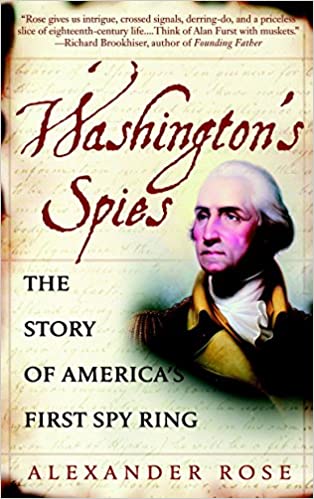
Combine spycraft with colonial America, and you’ve piqued my interests. Washington’s Spies is the story of George Washington’s intelligence apparatus that helped him win the revolutionary war.
The book primarily centers on the development and accomplishments of the Culper spy ring. This small group was tasked with collecting intelligence from British-occupied New York City and ferrying it to Washington by way of Setauket, Long Island. The intelligence collected by this ring was pivotal in the war effort and surprising in its effectiveness.
The nature of spycraft is such that the evidence necessary to tell a complete story is hidden. Still, Rose does a great job with what he has and is careful to identify the gaps and merely suggest potential theories rather than affirming them. The book balances descriptions of the characters with spycraft features, detailing information about the encryption and obfuscation methods used. I particularly enjoyed the discussion of the development of the ring’s invisible ink.
The book does get a little lost in describing some characters and relationships and lineage, which don’t seem entirely essential to the story. But, it’s a relatively short book so these moments pass quickly. I particularly appreciated the insight into Washington’s perspective on intelligence and his astuteness as a military commander. I also enjoyed learning about Benjamin Tallmadge and Abraham Woodhull, perhaps two of the revolution’s most important unsung heroes.
There’s also an AMC TV series loosely based on the Culper spy ring, called Turn: Washington’s Spies. I wound up watching it after reading the book, and it’s absolutely fantastic. Of course, it’s more entertainment than history, but it’s great entertainment none the less. The final episode ends with a quote I wrote on a sticky note that currently sits on my desk — “The Revolution Never Ends.”
Next Year
I read more in 2020 than I think I ever have in any prior year, in part as a result of my doctoral work and the pandemic’s contribution, which kept me home more. While I look forward to seeing the pandemic under control next year, I hope I’m able to keep reading at the same pace. Increasingly, some of the best things I read are research papers, but those aren’t the most accessible, so I’ll probably keep sharing those on social media.
Did you have a favorite book you read this year or a recommendation you think I’d like? If so, I’d love to hear about it in the comments.
Astounding (!) to have the energy to read-on-the-side while in your doctoral program. Whenever I was in school, I looked forward to graduation so that I might have the opportunity to read – for pleasure. (Though I did enjoy my reading during various schooling.)
Here’s the first book recommendation that came to mind. And I have not finished it, yet! It was a book begun, set aside, and then came the realization that I need to start it over. The first half was fascinating, though.
Take a look at Amir Alexander’s “Infinitesimal: How a Dangerous Mathematical Theory Shaped the Modern World”. I did not pick it because the title looked highbrow. It is actually quite readable, which is surprising given the topic. History. Jesuits. Calculus…..
You might already know that:
Why Don’t Students Like School?: A Cognitive Scientist Answers Questions About How the Mind Works and What It Means for the Classroom Paperback – 27 Jun. 2021 by Daniel T. Willingham
I’m a teacher at a vocational school teaching future IT professionals. I found your website while googling for honeypots. I was quite surprised to see that you are also very interested in teaching and cognitive psychology. I think chatting with you would be very interesting.